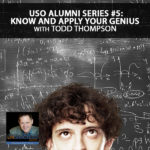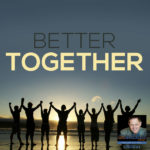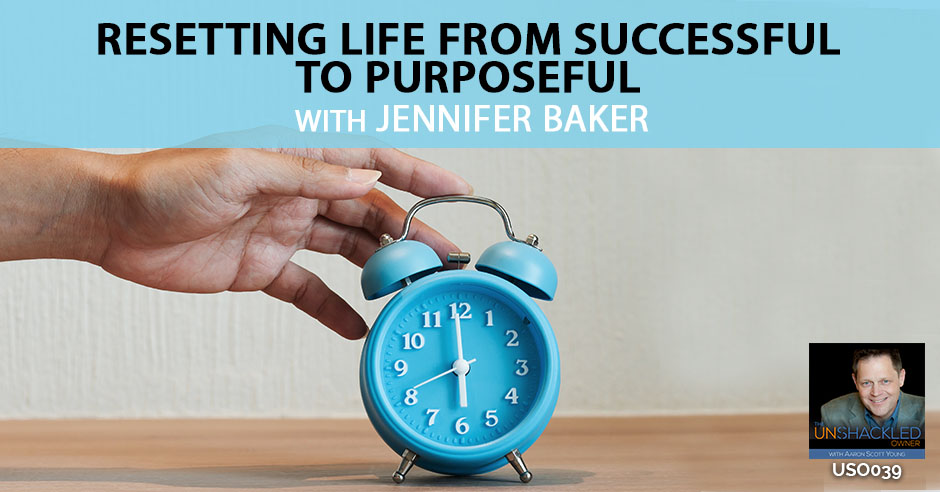 From the time she was a teenager, Jennifer Baker has been focusing on income and started researching what she wanted to do in college. She was a writer who has written for a lot of literary magazines, and thought she was going to pursue journalism until she started looking at it from a monetary standpoint and realized she could never live in that modest income. Jennifer has always been good at resetting life to suit her goals. She went into court reporting, instead of journalism, and afterwards joined the gaming industry. She built her way up from there into being a casino executive and ran the largest gaming company in the world. From the outside, it looked like she had everything under control, but underneath she was paddling upstream. Under all that stress and health issues, she decided to turn her life around. She pivoted her focus to turning companies around and helping them become more efficient so they can stay alive and survive the economy. Discover how Jennifer was able to hit the reset button on her life and left her executive level position in the Casino industry to fulfill her true passion and purpose and be who she was supposed to be to help others find, understand, and achieve their true success.
From the time she was a teenager, Jennifer Baker has been focusing on income and started researching what she wanted to do in college. She was a writer who has written for a lot of literary magazines, and thought she was going to pursue journalism until she started looking at it from a monetary standpoint and realized she could never live in that modest income. Jennifer has always been good at resetting life to suit her goals. She went into court reporting, instead of journalism, and afterwards joined the gaming industry. She built her way up from there into being a casino executive and ran the largest gaming company in the world. From the outside, it looked like she had everything under control, but underneath she was paddling upstream. Under all that stress and health issues, she decided to turn her life around. She pivoted her focus to turning companies around and helping them become more efficient so they can stay alive and survive the economy. Discover how Jennifer was able to hit the reset button on her life and left her executive level position in the Casino industry to fulfill her true passion and purpose and be who she was supposed to be to help others find, understand, and achieve their true success.
—
I’m here with Jennifer Baker, author, speaker and consultant. She puts on a great event up in Lake Tahoe. We’re new friends. We met recently where we were both at the City Summit. Then we’re both presenting at The Best You event. We keep bumping into each other and I thought there’s got to be a reason for this.
Listen To The Episode Here
Resetting Life from
Successful To Purposeful with Jennifer Baker
Jennifer, welcome to The Unshackled Owner podcast.
Thank you for having me, Aaron.
You’re welcome. Thanks for making time. Let’s go way back to the beginning. Tell me a little bit about how you grew up. Your mom and dad, where you lived, who you were as a kid.
Way back then we used to have six to twenty feet of snow up in the High Sierra mountains. I loved being a kid in the outdoors. Running around sort of being a tomboy up in the northern Nevada area where I grew up. I was actually born in LA but raised in all of northern Nevada. I had a blast. I was exploratory kid in the mountains and I love animals and had a lot of fun just chasing wildlife.
When you say Northern Nevada, are you talking about Reno or Tahoe? What are we talking about?
We landed in Reno. I actually mean all around northern Nevada. Reno, Carson, Douglas County. I spent the majority of my time up in Virginia City, Nevada. Your audience would remember the show Bonanza if they were older than us. Virginia City where the west is still one. I spent most of my time in those old schools that were built in the 1800s back in the gold rush days.
Virginia City is one of the most fascinating places. I know that you’re active in caring about Nevada. Virginia City is one of those places that desperately need some funding to preserve it because it’s so much. The old mining town, was it gold or was it silver?
It initially started as gold and then it turned into silver because they kept running into this muck. They found out it was silver and actually there’s a little history back there. You’re absolutely right. We really need to preserve the history of Virginia City. Virginia City, Nevada is the reason that America is the way it is today. I don’t know if you know this but it was Battle Born is the title of it Nevada. It’s because we were born during the civil war. We supplied the silver and gold to the north to win the war. We actually are quite pivotal in American history.
The mint is still down there in Carson City. There are so many interesting things especially if you’re a silver buff or a coin collector. That area in Northern Nevada is important to the history of our money system. Virginia City is such a fascinating place on that steep, steep hillside. Every street denoted a different class of citizen. It’s a very interesting place. Having been a kid around Virginia City, I didn’t even know people really lived there. Very many people actually lived in Virginia City. It’s not very big. It kind of sits out there all by itself. You drive up one of the two ways up there, Geiger Grade and they had to bring the silver or the gold up and down this hill that’s very steep hillside. All this stuff that you’d see in the old western movies about robbing the stage. Stealing the gold from the guys that are transporting it. That’s what was going on in Geiger grade.
I love the history Northern Nevada as it relates to our western culture. That’s part of the Great Basin. The real buckaroos, the cowboys, the big loop guys, all that stuff is Northern Nevada, Eastern Oregon, nudging up into Wyoming. It’s a really cool history. The mining that we’re talking about with Virginia City was super, super important too. Creating a wealth that opened up these big ranches out there. Bonanza, the Ponderosa was supposed to be a big cattle ranch.
That’s where I grew up and you’ll understand a little bit about my personality after hearing that, I’m sure. I actually didn’t grow up in Virginia City. I grew up in a place called Mark Twain, Nevada, which is still on the map. We were actually bust. You’ll like the old scenario. 45 minutes plus each way, each day, to go to school to Virginia City. That big town that would’ve had a graduating class if I would have stayed there at about eleven.
Mark Twain made his way to Virginia City and was a writer there at the newspaper. We think of Mark Twain in that white suit. We think of him as a southern character with Huckleberry Finn, Tom Sawyer. He was actually out in the west later in his life and was a writer out there in Virginia City. Did you see any roots of entrepreneurship as a kid? Were you involved in student government? Were you an athlete like? What was your story as a kid?

Resetting Life: You learn that there are no real handouts in the world. You have to figure things out on your own with very little assistance.
Yes and no. We had to make ends meet and make do with whatever we had up there as you can imagine. The west is still one there today. Entrepreneurialism runs in the blood of everyone who goes to school or surrounds themselves in those areas. You really learn in small towns and this is as small towns anywhere in America. You learn that there are no real handouts in the world. You really have to figure things out on your own with very little assistance. I think it makes a very wise person. That’s where I learned, I think that I could figure anything out. My nickname when I’m out with my friends is She Gyver because I can rig just about anything. One foot in a jam, I can figure out how to put anything back together with the old joke about duct tape and super glue works really well. The entrepreneurial spirit I think starts with someone understanding that there’s no one else out there to do something that needs to be done. You need to figure it out yourself. I think that started as a kid going to school up there. Learning the history and I became a huge history buff. Which probably lead me into my political focus and wanting to get involved and do different things at the state level. I think the entrepreneurialism came when I was in my teens. I moved down to the big city of Reno. Eventually after three or four moves we found civilization in Reno, which is much more civilized today. It sounds like it was so long ago.
Entrepreneurialism started for me. When I was working my first couple of jobs it was an hourly job. It was a very neat wage back then but it was something. I didn’t like asking my parents for money. I got my first job at age twelve. I earned my own money from the age of twelve on. When I was in my later teens I discovered this thing called sales and bonuses. After that the world just couldn’t hold me back. I made whatever the hourly wage was to do the job. I got into telesales of a vacuum cleaner or carpet cleaners at that time. We were told if we set the appointment we’d get an extra dollar per point. I started figuring out how many appointments I could set in an hour. I made an additional $8 an hour by setting appointments. Then I heard that if you close the appointment, you made an extra $20 per closing. I thought, “How do I effectively make that many calls? Close as many appointments as I could in that hour? Then make sure that they actually closed the deal when I sent the outside salesperson in, so I could maximize my efforts.” I think that’s really where the entrepreneurialism kicked into my blood and after that I just couldn’t be helped.
People don’t really understand about sales. Even a lot of people in sales don’t start thinking, “Here are all the pieces that can work in my favor. I can be rewarded in a number of ways.” This is true for our sales department. Every one that I’ve ever been in charge of or everyone I’ve ever observed. There’s always multiple ways you can make money. Most people find the one that’s easiest for them to understand and focus on that. Instead of going, “From a holistic standpoint, how do I maximize every hour, every phone call.” You figured it out as a kid, which is super impressive. Pack up your little guitar and hatbox, get on the train and leave Mark Twain, Nevada. Now you’ve graduated from high school. Did you go to college?
I did. I went to the university here in town and then I decided I was going to leave town. Every kid I believe has a spirit of, “I need to leave this place because it’s no good. I need to go and stretch and be and do somewhere else.”I went all the way to Sacramento, California and that was far enough.
From Mark Twain to Reno to Sacramento. It’s definitely moving up as far population is concerned. You got to Sacramento. You went to school. What did you study?
I grew up a very modest young lady. You’ve heard me talk about focusing on income at that time when I was a teenager. I started researching what I really loved. What I was passionate about doing was either teaching or journalism. As I grew up through the years I was a writer. I did a lot of different things. I was in the literary magazines, all kinds of fun things. I started researching in high school what I wanted to do for college. I really thought I would become a journalist until we started looking at the income. I already knew I grew up as a modest income family and I always that I would never live that way. I needed to go better. I needed to go find more income. I skipped out on the whole journalism idea and went straight for court reporting. At that time they were the highest paid income from what I enjoy doing. I actually went to both schools for court reporting for as long as I could and business. Those were my two focuses. That was short lived because I found out you really can’t live in that world for long making that kind of money. I wanted something that would last longer as a career. I came back home and reset. My family had already been leaders in the gaming industry. I dropped into the gaming industry and built my way up from there into being a casino executive. I ran the largest gaming company in the world at the time. I didn’t run the whole company, but I ran five properties.
Five hotels or five casinos?
Hotel casinos, yes. It was Harrah’s Corporation back then. Now it’s Caesars Corporation.
You worked for them and you ran five other properties.
Reno, Tahoe, and then we booked all over the world. It was really Reno, Tahoe, Atlantic City and Las Vegas back then.
There was Harrah’s Hotel.
Yes. Harrah’s Casino Hotel.
You did that for a while. That’s definitely corporate. I don’t know if it feels big corporate or if it feels still closely held. What was it like inside of Harrah’s?
I started out in the smaller casinos at that time, at the Reno Hilton, the Atlanta’s the Silver Legacy, the El Dorado. Those were smaller corporate. I ended my career at Harrah’s. I would say that I had the best of both corporate worlds. I have the small family-ran companies all the way to the largest corporation. I liked all of it. Most people would have one preference or another. I think I preferred the structure of the Harrah’s Corporation because it was a larger corporation. It was a huge corporation. The properties that we worked with, that little property was the original. I’m a big historic check person. You’ll find that as we talk. The Harrah’s in Reno was the original Bill Harrah’s property that started the Harrah’s phenomenon and the gaming phenomenon throughout the world. I felt like it was a small town corporation. A little place to work but you always knew it was this large entity. I booked places and sent people all across the world at that time, to go and gamble, spend time, and enjoy their vacation time.
Like a lot of people that listen to the podcast. You were working in a job. You were doing well in your job. You were making money. You had a lot of what most people think of is like winning the lottery. You had a good job, a job of responsibility where you could kind of call your own shots. You made really good money as you rose to that senior executive level. Why did you leave Corporate America? Why did you leave Harrah’s? I’m sure you could have made a career there. Why did you decide to make the jump and to start your own stuff?

Resetting Life: Some people would say that’s your purpose or your passion. I called it the best of both worlds.
I loved my job. I can say that with my whole heart. Not Joking. I really did love doing what I did because I loved the people I surrounded myself with. I didn’t love what I was doing as a soul in the world today where I’m supposed to be doing what I’m supposed to be doing. Some people would say that’s your purpose, your passion, etc. I called it the best of both worlds. I decided to have a family somewhere in those twenty years that I was in the casino industry. During that time, I became very ill. I was living against what I was supposed to be doing. I was under a huge amount of stress. During that time I decided to have children.
On the operating table bed, I made the decision to leave that industry. Decided to stay alive and stay healthy, and find a better path that I was supposed to be working off of. It was not by choice. It was more of facing the realities of life. That I was building an empire that belonged to someone else. I did make great money and I afforded a really nice family life for my family. We had a beautiful future. I had some cool claims to fame being the youngest executive in my position during that time was a big deal, especially being a female in a male driven industry. I am not sexist in that way at all. Way back then it was a big deal to be where I was and to do what I did. I was very proud of myself. Casino owners gave me a lot leeway to make decisions that were pretty large and affected huge things. They gave me a lot of power.
Coming from small towns, any ounce of power that you get you, you tend to become a little power hungry. I was very happy there, but it ended up eating away at me from the inside out. Every person who is very strong type A personality. You’ll find that stress is internalized. You don’t usually blow your calf. You internalize it and you keep your cool. It was a joke. They used to call me the Duck. I don’t know if you remember this but again ages me really terribly. There was a Convoy movie way back in the 70s.They talked about the guy that was calm and cool on the surface and paddled like hell underneath. Excuse me for saying that. That’s what they used to call me. I was usually the one that was getting things done and running constantly. I always looked like I had everything under control.
My health became the issue. I was raising two young children. At the time my son was two and a half. My daughter was maybe ten months old when the emergency hit. I just said, “I get it. This is a wakeup call.” I made a couple of deals with myself and prayed. I decided that I was going to reset my life. Get myself in the focus of where I really need to make a difference. Be who I was supposed to be. As a kid I knew I needed to do something really big. I just didn’t understand what it was. I thought maybe the gaming world was me helping people with their problem addictions. I would run into people with issues, infidelity, or gambling issues. Whatever it was I used to kind of talk them out of it and help them get on a better path. Thought that was kind of cool. I found out later that really it was a much bigger path than I had ever imagined. I’ve been on it now for the last eleven years.
You decided it’s time to do it. What did you do?
I started the strategic plan. Everything I did back then was very planned. I started this strategic plan. I wanted to eliminate everything in my life except my house, my kids, and my car. That was it. I systematically for the next few years put it into motion. By the time I was I finished, I started coaching classes. I did actually think I’d become an executive coach. I went to all these different programs. As a young teenager I actually attended some really great personal development events. I started back into that, going into different personal development. Focusing on who I was going to become. I opened my business by focusing on what I already did. Internet marketing, which was really easy for me, I started marketing based on email marketing, websites, and those types of things. To focus on trying to find executives that were going through the same thing I went through. It was 2007, you can remember back then?
Instead of running into executives, because again, I lived in Nevada. We have more business owners than we had executives during that time. I started working with business owners instead of executives about what they were doing and how to make a bigger impact in their world. How to increase their effectiveness in sales because that’s they all wanted. When they all met me, they were like, “How do I do marketing? How do I do this? How do I do that?” I helped them, which was great. I saw the economy coming to a very hard stop. I started focusing on trying to save businesses. Help them find residual income or multiple streams of income from doing whatever it was they were doing.
The poor plumber, I knew it was coming to a halt. There were a lot of plumbers in town. There was a lot of printing companies in town. I knew that we were going to have a very hard fast stop coming when you were looking at the economy, painting all across the country. I started working on corporate turnaround work and turning companies around. Helping them become more efficient so they can stay alive. I also was part of the huge Buy Local Movement in Nevada. We turned everything inwards, try to start buying from each other so that we can survive the economy. You know this but your audience might not, Nevada was one of the hardest hit in the nation when the economy tanked in the ‘08 through ten years. I was a part of holding onto whatever we could. It became sort of a, “Hold onto your shorts while we get through this. Then when we’re finished, we’re all going to come out a lot stronger.” Fortunately we have ended that. We’ve made a lot of very difficult decisions to turn the economic situations around. I think we’re thriving today. Finally, after all that hard work.
Tell me about what do you do for businesses now? What do you spend most of your time doing now? What are you learning from your entrepreneurial journey?
What do I do now? At the moment, I spend most of my time fighting the economic atmosphere. Working with people who effect the economic atmosphere through the political, policy-making world.
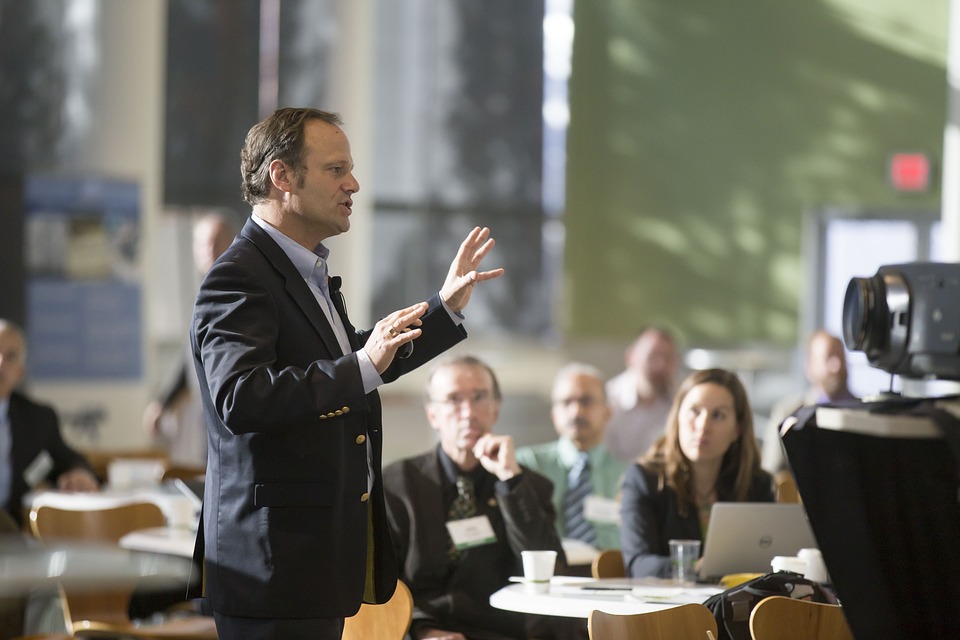
Resetting Life: If the business economic atmosphere isn’t conducive for a business to survive, then there’s nothing you can do besides go to a better atmosphere and/or start fighting.
You’re taking on the man, is that what you’re doing?
Taking on Uncle Sam? Not exactly. Uncle Sam’s not one to be fought with. I’m a political consultant, so I do work with people at the legislature and the US and national levels focused on what can we do to continue a business-friendly economic atmosphere. This really started from the beginning. It doesn’t matter how good you are at growing a business and doing whatever it is you do with your widgets, skidgets, gadgets, whatever. If the business economic atmosphere isn’t conducive for a business to survive, then there’s nothing you can do besides go to a better atmosphere and, or start fighting. That’s what I did. I still do that today. I’ve never let go of holding on and trying to help the small business owners. My passion is in teaching small business owners what they really need to know in order to run their businesses every day effectively. I don’t like seeing the atmosphere in the world today where you’re seeing kids being raised by nannies, by their teachers, and every after school program in the world. The latchkey kid is part of what I believe is wrong with the world today. I like getting the business owners to be able to take time off to go back home. It’s along your theme of the Unshackled Owner. If parents were there to love and raise their kids more often. We would have a better atmosphere in the world today.
I teach them what they need to know so they can work from home more often. They can bring their kids in more often. I give them permission to bring their kids in. My children were running United States Senate Campaign through Presidential Campaigns with me at the age of three and five. They were sitting on the legislative floor and on US senator’s lap, climbing all over them. I was unapologetic about it. I know it’s something different for everyone. They all learn own way. My son’s first high five was from the owner of one of the casinos that I worked for. These were the things that I brought back to the world. That was what I did then and it’s still a lot of what I do today. I work with it business owners, but I teach them the simple things they need to know. I do more seminars now than I do one on one. The clients that I will work on one on one are ones that I see has something really intricate that needs my attention. I’ll focus on them for as long as they need and then I try to set them free by getting them the next level of experts that I need to work on
What are you learning from all of this? What can you teach these business owners in our audience? What are you finding that works for you? That you see that works for business owners for them to break out of being self-employed? To really becoming successful in business? You’re helping a lot of people. What do you see that some of the steps are that people need to be following or at least need to be experimenting with so that they can have a higher level of success?
The most common theme I find, no matter what industry it is. Everyone thinks they need money. They all need capital. I helped several different programs. I coach and work with all types of different businesses to grow and or startup. Every one of them says I need capital. I need loans. I need investors. I tell every one of them today it’s so much easier to bootstrap a company. Do digital marketing and get things going on more of a drip funnels than coming in with a fire hydrant wide open and having everybody invest in your business. There are certain businesses that you have to have investors and you have to go that direction. For the most part today, it’s really easy to bootstrap a business. The mindset of the SBDCs, the SBAs and all the other business startups with how do we get capital. We see different reality TV shows talking about they would lend money to everyone. Instead of telling the people just go get to work. Just go start working. Start small, throw your weight into something. I believe that as humans, our typical nature is to start small and grow. We all crawled before we walked. For the most part, we all started somewhere. In a business it’s the exact same thing.
I believe, even in the corporate world, I know that you can you imagine. It’s been a long time but every family members that started in the corporations with us. We all joked about a lot of nepotism. All the really effective corporate owners and corporate executives that I worked with started out in the lowest areas of the company and work their way up through the ranks. By the time they took over as one of the top executive, Vice President, CEO, whatever, they knew the intricate details of every single part of that business. When something went wrong, they could go back and work on it. I learned that from several of the people that I’ve worked with over the years. Most of my gaming guests had to spend more than a million dollars to even work with me as their host. The common theme that I found back then and it’s the same thing I find today. Except what I find is a lot of them look at whoever they’re talking to and say, “Can’t you just do it for me?”The answer is no, I can’t. The way you grow is to learn it yourself first. If you want someone else to take over something you don’t like doing, that’s different.

Resetting Life: The way you grow is to learn it yourself first. If you want someone else to take over something you don’t like doing, that’s different.
The common thing I find that people just don’t want to learn every avenue of their business. They just want to do what they want to do to make the money they want. They want somebody else to do all the difficult things. Which is fine. I do believe that you focus on what you love doing most. You really need to know every avenue of your business before you let it go. I’ve seen where most people have been defrauded. Things happen inside the business that you may or may not have known about, that you should have known about. That came back to bite you later because you didn’t pay attention to it. I like teaching them that they really do need to know every aspect of their business before they let it go to someone else to run whatever department or whatever issue happening. That’s a real common theme. What I teach them for business stuff is digital marketing. Those are my two key a-ha things that I get out of the world today when I talk to business owners. Most of them still are resistant to digital marketing, if you can believe that. Strange.
They’re resistant to it?
They want to do it. They don’t want to be the one to do it themselves. They hire out someone else to do their own digital impressions. If you can imagine the insanity in my mind is you want to give away your most important first impression to a person that is not in your company. That does not represent your voice or your personality to go grow your business.
It’s important for people to understand all the elements of the business, at least at the beginning. I was a singer as a young guy, as a kid, a young man. One of my mentors stopped me one time because I was trying to put my own fingerprints on a song. She stopped playing the piano and she said, “Aaron, listen. First you learn the sheet music and then you can improvise.” It’s always stuck with me. First, learn how to do it properly. Learn all the elements of what you’re supposed to do. Then once you own that, once you can do it just perfectly off the sheet music, then you can start fiddling around with it. A lot of people come in and all they do is improvise constantly. They wonder why they never get very good at anything. They’ve never really learned how the business works.
How the marketing works? How sales works? How the CRM works? What are we doing with accounting? What’s a statement of cashflow? How do you put together a chart of accounts? They don’t even know this stuff means. All they know is I started a business and I, whatever, I sell vacuum cleaners. They don’t really know why any of it works. Even if they have success, it’s usually not duplicatable. They have one lucky success and then they go back and they spend the rest of their career wringing their hands over.“What’s wrong with me? Why can’t I be successful again?” It’s because they never learned really what they were doing. I’m a huge proponent of delegating it as quickly as you can. You can’t delegate something you don’t understand.
It never hurts to circle back around and re-shop it. This is something that I’m very passionate about, re-shopping your business. I tell business owners and corporate executives regularly. Do your star- 69 or block your phone number and call your office just to see how they behave. I’ll give a little bit of Kudos. John Harrah, he was one of the best mentors I had in business for a couple of reasons. He believed that it was everyone’s job to do everything. No one had their own individual job that they had to do. Everyone had their level of expertise that they focused on in a day. If you were walking through the property and you saw a piece of garbage on the ground, it was your job to pick it up. It’s not the custodian’s job to come by and pick it up. It’s your job. If you saw someone looking for help and they looked frustrated, it was your job to go over and see what it was you could do to help. I loved that. I used that in my coaching world when I started working with businesses. I still use it today. I tell everybody eliminate your title and just be who you need to be in every atmosphere you’re in.
People ask me all the time, “What’s your title? What you do?” I joke, the first thing I say to someone when I meet them is I say, “I’m the lead grunt,” and it always throws them off. We start from there. It just means that I’m not interested in boasting about my titles. I’m not interested in telling you all about me. There’s a reason when you and I connected. We didn’t know at the time, but I wanted to know what the reason was to connect. Not necessarily doing a pitch fest for each other as to what we could do together. Who we were and the importance of who we are as a business owner more than who we are as a soul and a person who’s supposed to be connected. I love to throw people off and make them laugh. I love to make them think out of the box. I think out of everything, I’m probably an aggregator of irritation. I go around and I’ll stir things up just to make people think outside of the box.
Where do you see yourself going from here? I met your children, your two children and they were awesome, Nathan and Michaela. Great kids. Your youngest is, I think concluding her eighth grade. You got four years ahead and you’ve made it clear that family and raising good kids is paramount in your mind to a healthy world. My youngest is nineteen, my oldest is 28. My two oldest kids are married. I’ve got three grandkids. I’ll tell you that even as they grow up, you’re not done when they when they drive off to college, knowing that your parenting job doesn’t end at eighteen or nineteen years old. What does that mean for Jennifer Baker as you go forward with your business and with your helping people? I know you do it with a sense of not just of wealth creation, but also of improving how things are. Saving those small business owners and helping push Congress, an assembly, or whatever, to be making good choices for businesses and for families. What do you want to do with yourself? What’s the iteration that comes as these kids grow up and you have more time to really go out and slay dragons? What does Jennifer want to do?
You’ve heard me talk about leaving the legacy that’s most important. Setting the foundation for the next couple of generations. Moving forward means that you really focus on what you’re doing. My most important task at hand is to make sure that I’m focused on the next generation. I actually have two generations of kids coming up behind me. My stepson has blessed me with three grandchildren. My first and foremost goal is to make sure that they still have their foundation. I haven’t focused a whole lot on what I’m going to be doing five years from now, only because I’m not quite finished with it. Doing what I’m doing just at much stronger level, probably focusing a little bit more on myself, which is not something I do. I will be traveling a lot more. I’ve had many opportunities to go travel and speak throughout the world. I’ve turned down most of them because anytime I’m more than a day away from my kids. I’m not interested in going too much further unless I can take them with me. Unfortunately with the schedule that we keep, they can’t come with me everywhere I go.
I will be doing more traveling, more international work. I do international webinars and seminars now. I’ll do more of that so that we can impact a larger world. Not just our community here at United States. I’ll be focusing more on most likely some larger projects coming up in the next two years in our local community which is different. The last couple of years I’ve been outside of the community within a day’s travel. I know in the next two years we have some incredibly large things happening here or the business atmosphere. I will be focusing on more of the national issues coming up. I do know it’ll be more political focus. As for my speaking and the other fun things that I love doing, that I know are helping people see outside of their strange focus of just got to go to work, got to put my boots on and go produce each day. That will be still to be told. I’m not really sure where that’s going to go at this point.
The mystery continues. I love what you’re talking about. As we kind of sum up here, Jen, do you have a book or that you recommend to people that they should read? What’s a book that’s really influenced you?
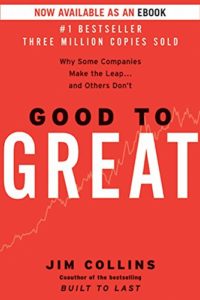
Good to Great: Why Some Companies Make the Leap…And Others Don’t
There are three. Good to Great was very helpful to me. I’m a people pleaser. I love to help others. I love to make sure everyone’s okay and everyone can grow. I believe that everyone can be better than they were. Good to Great was one of those books that when I read it I remember thinking, “That’s harsh.” They talk about really dropping the bottom 10% to motivate the top 90% to do something different. I remember thinking, “You actually give up? Why would you do that?” I read that as a young adult. I think Good to Great was a really strong book for me. The other that I would say was key and instrumental was John Maxwell’s leadership books as a whole. We’ll just leave it in general. If you grab a John Maxwell leadership book, just read it. I suddenly forget the name but the one that influenced me most from John Maxwell was the book that was about leading from behind and not being the front runner. The third was The Slight Edge from Olson. Oddly, it’s putting one foot in front of the other doing the mundane, every day with a good attitude persistently and consistently. That will get you where you need to go because I am an all in person. I’m a light on, light off. You jump in, you’re all in, and you get things done. Learning to do things step by step and remembering to put one foot in front of the other with a good attitude. Even in the moments when it’s difficult or doing something you don’t really like doing. It was very helpful to me. Those are the three I would say that are really, really strong for me.
What about mantras or quotes or song lyrics, anything that something that you live by. Anything like that you can share with us?
One of the most profound things that I ever learned, going back to the John Maxwell moments. One that I can contribute to someone else was, “If you think you’re leading and no one’s following, you’re simply taking a walk.” That has led me in my focus in my community, in my leadership of companies, and in my family life. If you think you’re leading and no one’s following. If you look back and no one’s doing what you’ve taught them to do, there’s probably something wrong. You need to step back and do it again correctly. I do that often. I have no problem retracing steps and going back And helping somebody see something or reframing something so someone else can understand it so they can take it onto themselves and do it. That’s the one I can contribute to someone else. For me, the answer is yes. I’ll figure it out.
You’re a John Maxwell fan?
Yes. John Maxwell, Jack Canfield, Covey, I studied all of their work, all of them. I wanted so badly to grow and be the strongest person I could be. That I became a really, really strong personal development person. I’ve invested over $100,000 in personal development, anything with the best of the best. I just love hearing from them and I love speaking to wise people. A lot of them say, “If there’s anybody that you’ve ever wanted to go meet, who would it be?” I can tell you that everyone I’ve ever wanted to meet, I’ve met. I don’t really have a bucket list of people I want to go meet. I try and I accidentally meet amazing people like you. I don’t even have time anymore to put them on a bucket list. I just end up meeting them, which is fantastic. I put it in the energy a long time ago. Send me the wisest, the strongest, the smartest, the ones who will challenge me. He does.

Resetting Life: If you think you’re leading and no one’s following, you’re simply taking a walk.
Jen, you were certainly one of the wisest, the strongest, the most talented, the ones that we want to meet. I’m excited that we did, that our paths crossed. The expression I like is meaningful synchronicity. There’s something happened that brought us into a connection. It’s so much fun to watch these things unfold and to learn from wise people. I love the fact that you’re doing this leading from the heart, leading from a moral direction or a felt calling. That you’re doing so many things to help. Zig Ziglar talked about it. If you want to get what you want, help other people get what they want. You’re really one of those interesting people who inside the private sector is pushing to help businesses and then helping from the other side. Pushing government to think about businesses and thinking about families. We need to be proactive.
All of us do. We all at the minimum, you need to vote, folks. You need to vote. No matter what you vote for, vote for something but don’t just sit on the sidelines. Wherever you can, go out and have a breakfast with the politicians. Sit down with somebody who’s working on a committee. Do something if you care about something, you can get involved. Too many people believe that they are disenfranchised from the government. That’s a choice to be disenfranchised. Jennifer’s is a prime example of somebody who’s not letting the big machine necessarily be the one that forces business and her state. She’s pushing against the machine to make sure the machine is helping the people, which is what it’s all about. Super noble work, Jennifer. I’m grateful for that.
We’ve been talking with Jennifer Baker. Speaker, author, consultant, and just a great human being doing great work on the planet here on The Unshackled Owner podcast. We are here to help you be more successful, to live the life you want, to change out of old habits and explore new systems, processes, belief systems so that you really can become more successful. If you want to learn more, if you want to talk to me about how you can become an Unshackled Owner, you can go to AaronScottYoung.com and request some time. Write me Aaron@AaronScottYoung.com let’s see how we can help you become an Unshackled Owner. Until next time, this is Aaron Young for The Unshackled Owner podcast.
About Jennifer Baker
 Jennifer Baker is an International Speaker, best selling author and executive consultant.
Jennifer Baker is an International Speaker, best selling author and executive consultant.
Links Mentioned
- AaronScottYoung.com
- The Unshackled Owner Twitter
- The Unshackled Owner Facebook
- Aaron Scott Young LinkedIn

